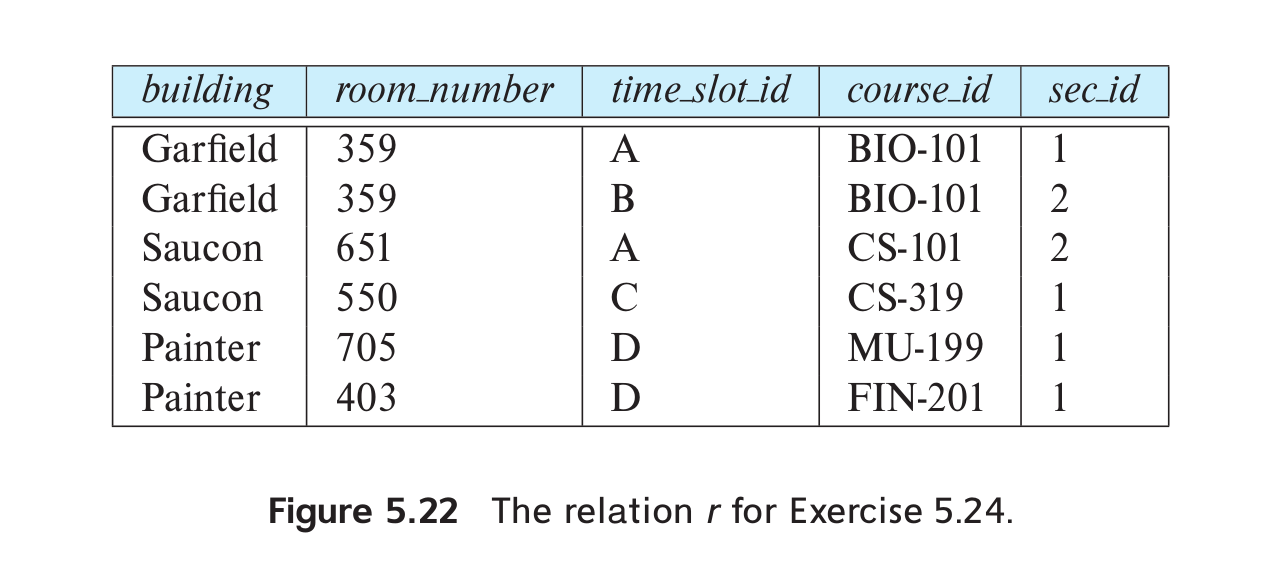5.24
Consider the relation, r, shown in Figure 5.22. Give the result of the following query:
SELECT building, room_number,time_slot_id,COUNT(*) FROM r GROUP BY ROLLUP(building,room_number,time_slot_id)
university=# SELECT building, room_number,time_slot_id,COUNT(*)
university-# FROM r
university-# GROUP BY ROLLUP(building,room_number,time_slot_id);
building | room_number | time_slot_id | count
----------+-------------+--------------+-------
| | | 6
Saucon | 651 | A | 1
Garfield | 359 | B | 1
Painter | 705 | D | 1
Saucon | 550 | C | 1
Garfield | 359 | A | 1
Painter | 403 | D | 1
Painter | 705 | | 1
Saucon | 550 | | 1
Saucon | 651 | | 1
Painter | 403 | | 1
Garfield | 359 | | 2
Saucon | | | 2
Garfield | | | 2
Painter | | | 2
(15 rows)
university=# But the output of given above is not much readable. The following is a bit better.
SELECT
(
CASE
WHEN GROUPING(building) = 1 THEN '(all)'
ELSE building
END
) AS building,
(
CASE
WHEN GROUPING(room_number) = 1 THEN '(all)'
ELSE room_number
END
) AS room_number,
(
CASE
WHEN GROUPING(time_slot_id) = 1 THEN '(all)'
ELSE time_slot_id
END
) AS time_slot_id,
COUNT(*)
FROM r
GROUP BY ROLLUP(building,room_number,time_slot_id)
ORDER BY (building,room_number,time_slot_id) NULLS LAST;OUTPUT:
building | room_number | time_slot_id | count
----------+-------------+--------------+-------
Garfield | 359 | A | 1
Garfield | 359 | B | 1
Garfield | 359 | (all) | 2
Garfield | (all) | (all) | 2
Painter | 403 | D | 1
Painter | 403 | (all) | 1
Painter | 705 | D | 1
Painter | 705 | (all) | 1
Painter | (all) | (all) | 2
Saucon | 550 | C | 1
Saucon | 550 | (all) | 1
Saucon | 651 | A | 1
Saucon | 651 | (all) | 1
Saucon | (all) | (all) | 2
(all) | (all) | (all) | 6
(15 rows)That is more like it!
Just in case you want to replicate the instance given at Figure 5.22 in your db.
CREATE TABLE r(
building VARCHAR(15),
room_number VARCHAR(7),
time_slot_id VARCHAR(4),
course_id VARCHAR(8),
sec_id VARCHAR(8),
PRIMARY KEY (building,room_number,time_slot_id,course_id,sec_id)
);
INSERT INTO r VALUES
('Garfield','359','A','BIO-101','1'),
('Garfield','359','B','BIO-101','2'),
('Saucon','651','A','CS-101','2'),
('Saucon','550','C','CS-319','1'),
('Painter','705','D','MU-199','1'),
('Painter','403','D','FIN-201','1');